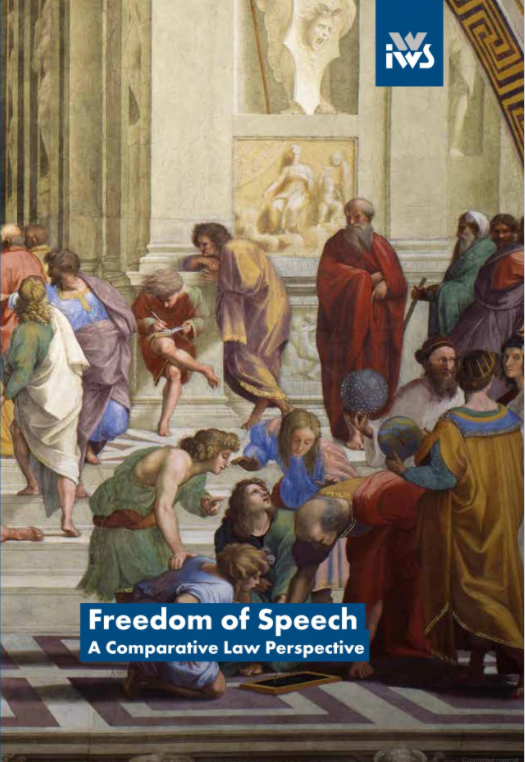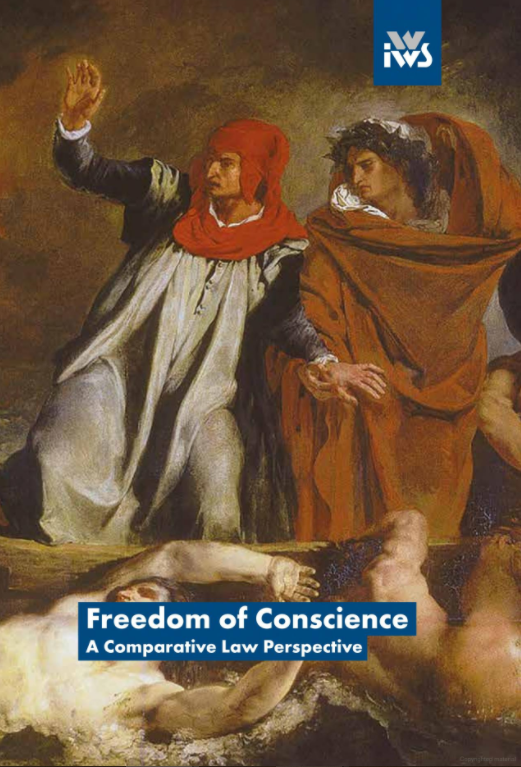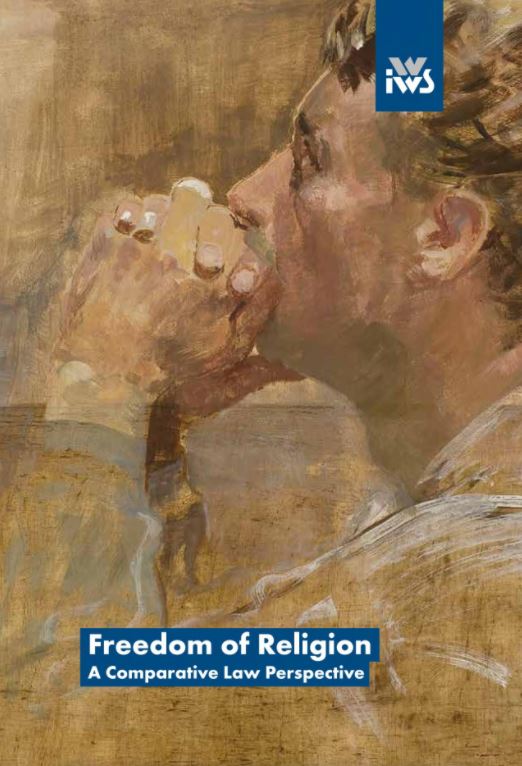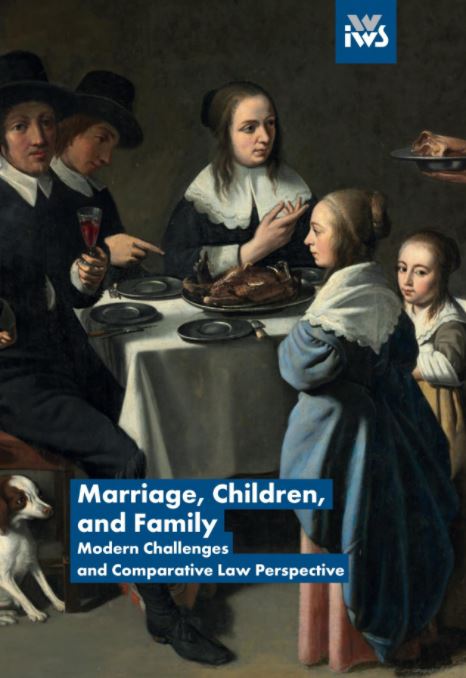
Freedoms, Religion, Family, and Public Policy: A Global Perspective
Grzegorz Blicharz
An Overview by Grzegorz Blicharz
This series of books was published by the Institute of Justice in Warsaw as part of the Public Order Protection Project. The Institute of Justice of Warsaw is a public research center subordinate to the Polish Minister of Justice which performs scientific and research activities in the area of lawmaking and the application, axiology and social operation of law. Public Order Protection Project was conducted by The Center for Family Research at the Nicolaus Copernicus University in Toruń as part of the research grant “Justice Policy 2018“, and concerned the analysis of selected regulations regarding values and fundamental rights (axiological norms) both in Polish and foreign legal orders oriented towards de lege lata and de lege ferenda conclusions. The issues were analyzed in five separate volumes, each of which was published in both Polish and English, for a total of ten volumes, overall. All of the volumes were published from 2019 to 2020. Those edited in Polish were edited both by Dr. Grzegorz Blicharz and Maciej Delijewski, whereas those in English by the former only. The editors gathered almost 40 experts from around the world, including Australia, South America, North America, and Europe, and the volumes were peer-reviewed by a team of scholarly reviewers from Poland and the United States. The project would not have been possible without the support of a research team composed of law students, PhD candidates, and lawyers who were responsible for preparing the initial analyses.
The books create a forum for discussion and among a variety of contributors coming from different legal traditions, which can serve as inspiration for both lawmakers and legal scholars to ask questions and seek answers. The broad comparative perspective, drawing from different continents, allows a greater distance to look at the challenges and processes occurring on a global scale. Accordingly, local reactions of specific legal orders are becoming more visible. The adoption of a comparative perspective may, in turn, enrich the discussions among legal scholars and legislators alike. It presents an opportunity to assess their own legal orders in a broader context. These books originated in Poland, but they provide broader and unique insight into legal systems around the world.
Freedom of Speech: A Comparative Law Perspective

This book is an analysis of contemporary law on freedom of expression, including the important topic of hate speech. Comparative perspectives from three continents — North America, Australia and Europe — provide a broad vantage point on the topic. The focus is on the regulation of freedom of expression on a global scale, as well as specific national legal contexts. The adoption of a comparative perspective within European countries, such as France, Spain, Germany, and Hungary, as well the United Kingdom, and including the broader frameworks of European regulations and of international law, can serve to enrich parallel discussions taking place in Polish law. Moreover, consideration of the experience of Australia, Canada, and the United States also turns out to be instructive for Europe. For Polish legal scholars and legislators, this is an opportunity to assess the national legal order in a broader context. It offers the possibility of comparing laws and legislation from other contexts with the Polish protections of freedom of speech and expression that have been strongly inscribed in the history of Poland.
Freedom of speech is confronted today, on one hand, with the phenomenon of its abuse and, on the other hand, with its excessive regulation. Questions about the limits and protection of freedom of expression are the subject of both intense academic reflection and heated social disputes. Human freedom is realized in community, and the law serves to give it a proper shape. Freedom in recognizing acceptable ethical and moral standards and their transgression is based on mutual respect and trust, which today seem frequently to be put to the test both in academia and in wider social, political, and artistic circles. The essays in this volume address questions about the freedom of speech in the sphere of academic research and institutional discourse. They also address artistic freedom and respect for unique forms of expression, but also possible limits when the goods and protections of other people or communities are violated.
Freedom of speech is confronted today, on one hand, with the phenomenon of its abuse and, on the other hand, with its excessive regulation.
The concept of hate speech has recently dominated discussions of freedom of expression around the world. It is difficult to assess whether penalization of hate speech can facilitate a civilized debate without offending others. It is worth considering whether regulation of hate speech can actually prevent crimes or has merely become a sophisticated tool for taking away the right to speak of those who try to convince the opponents of their arguments in various discussions. Although the scope and forms of exercising the freedom of speech have expanded considerably today, with our modern means of conversation, this does not automatically denote that the sphere of freedom of speech is growing. Freedom of expression, after all, is based on the ability to choose the right use of a words, images, and symbols in ways that do not express or incite hatred.
For the same reason, hatred cannot be a source of restrictions on freedom of speech. Being able to listen to the views of others allows us to form our own opinions, to create a more complete social life, and finally to seek the truth. Political forces and interest groups should have a chance to be heard in public debate, but what counts even more is the voice of every person as an individual. Contributors to the volume take up the phenomenon defined as “hate speech” and assess the legal rules which govern it from the point of view of protecting the fundamental freedom of speech, but also the fundamental value of human dignity.
Freedom of Conscience: A Comparative Law Perspective
The famous maxim passed on by the Roman jurist Paulus “non omne quod licet honestum est,” reminds us that not everything that is legally permitted is morally good and honorable. Honesty, decency, and human dignity can resist exercising certain rights. The clash of legal norms and morality at the individual and community levels is particularly evident in modern times. It engages public opinion in borderline situations when an individual opposes the application of the law or the exercise of right by another person due to the right of conscience. It refers not only to religious beliefs, but also to confronting the applicable law with the values which belong to universal ethics. In fact, the question of the conscience clause and the right to conscientious objection leads to reflection on anthropology and its importance in shaping legal norms.
The question of the meaning of “being guided by the voice of conscience” or “living according to conscience” arises. In the case of law, the answer refers to the extent to which the law recognizes the requirements of conscience and how deeply it understands this dimension of humanity. As the late U.S. Supreme Court Justice Antonin Scalia rightly observed of freedom of conscience in his last public appearance, it is “not just to be zealous in the pursuit of your ideals, but to be sure that your ideals are the right ones” so that “when you follow your conscience, you will be headed in the right direction.” This is the task of each individual and the community as a whole.

This book is thus a collection of experiences from many countries on regulations that concern conscientious objection and conscience clauses in law. The volume’s broad comparative law perspective reminds us of the universal nature of problems and the universal values that determine the shape of given legal solutions different national context. Freedom of conscience presents both terminological problems, around concepts such as “conscientious objection” and “conscience clauses,” as well as more complex and axiological ones relating to the genesis, essence, value, and nature of the protection of freedom of conscience. Theoretical considerations frequently lead to many practical issues faced by persons, both natural and legal, representing various professions.
Special challenges are encountered by employees associated with daily health care services, such as pharmacists, doctors, and other in the medical services field. Recently, entrepreneurs who seem to represent less conflict-generating sectors, such as bakers, florists, and photographers, and even corporations and state employees, have had to confront the question of the freedom of conscience. These individuals experience ethical and moral conflicts that may result, for example, from the logic of protecting human life and health which underlies the principles of medical professions or from religious or ethical beliefs regarding marriage, family, or military service. In these situations, the basic human rights and freedoms guaranteed by many international instruments are confronted with the statutory law of individual countries, which sometimes negates or limits them.
Contributors to this volume offer an analysis of doctrinal concepts, philosophical assumptions, and individual legal solutions, underlying the regulation of the conscience clause and conscientious objection. Legal scholars from Poland, the United States, Great Britain, Norway, Sweden, Finland, and Italy offer a broad analysis of legal regulations in various national contexts in both Continental and Anglo-Saxon legal systems. The contributors also take into account the growing phenomenon of the ideologization of law. The purpose of the volume is not to provide model legal solutions, but to rather to indicate the positive and negative aspects of the analyzed orders. In confronting dynamic changes in the protection of freedom of conscience, which increasingly depend on the decisions of the courts, it is important to find solid foundations based on universal values that every legislator, judge and lawyer should take into account.
Freedom of Religion: A Comparative Law Perspective
The protection of religious freedom is one of the most important human rights guarantees, respected in all significant and universally binding international instruments. The fundamental questions faced by the authors of the book are to what extent the presence of religious symbols in public spaces are legitimate, whether the protection of religious feelings or sensibilities is at risk, and what measures should be taken in terms of legislative actions to improve the situation. The present volume is a contribution to the debate about the scope of religious freedom in the legal systems of the Western world. The authors of the studies collected herein analyze legal solutions applied in Poland, Italy, Hungary, and the United States, in light of international law.
The presence of religious symbols in public spaces is a delicate issue of legal regulation.
The presence of religious symbols in public spaces is a delicate issue of legal regulation. Controversies related to their display frequently do not result from aversion to religion, but rather from a wrongly understood secularism or neutrality of the state. Against this background, there are terminological and interpretative doubts which have become weapons of struggle either to narrow or to extend certain laws. As a result, the norms introduced to protect the individuals, in light of their spiritual, social, and communal natures, require the presence of religion and religious symbols in public spaces.
On the occasion of the widely noted decision of the European Court of Human Rights in the case of Lautsi v. Italy, European and international legal scholars realized the importance of religious freedom. In that decision, the prevailing opinion that the legal relation between the state and religion should be shaped in accordance with the tradition, history and culture of a given nation. Thus, it is unacceptable to impose on all countries one model of these relationships, whether secular or denominational.

The protection of religious feelings, along with the presence of religion in public spaces, further indicates the degree of respect for the public presence of religion within a given legal order. Unfortunately, the phenomenon of the deprivation of religious freedom in the public sphere in some countries, as well as acquiescence to the persecution of believers and the desecration of religious symbols is becoming more and more visible. Thus, it is important to indicate the limit of acceptable expression directed at both the believers themselves and the symbols that may be important to them. Transgression of this infringes upon the effective protection of religious freedom and leads to discrimination against those who publicly profess their faith. The protection of religious feelings, not only of individuals, but also of communities of the faithful, appears to be of crucial importance.
Contributors to this volume assessment the legal mechanisms and instruments that should be applied in a modern state, as well as those that should be regarded as obsolete or inadequate in present times, for the protection of religious freedom. The intention of the contributors is not to suggests a specific legal framework. Instead, they emphasize universal principles that allow the state to protect individual and community religious freedom, while respecting the fundamental principles of a democratic state ruled by law.
Marriage, Children, and Family: Modern Challenges and Comparative Law Perspective
This volume in the series offers a comparative law analysis of a triad of sensitive issues in the field of family law: the legal nature of marriage and ways of resolving marriage conflicts, protection of children from sexualization, and the issues involuntary addiction treatment. The subjects of the study are the legal systems of continental Europe, including Poland, Hungary, Germany, Austria, and France, as well as the Anglo-American legal systems of the United States, Great Britain, and Australia. The volume’s contributors also take into account European Union and international standards.
Family life increasingly presents serious legal issues, which frequently lead to and feed into heated social and ideological disputes. The regulation of family life reflects the mission of the state as a guarantor of fundamental rights, support for marriage and the family, as well as public security, health, and morality. In recent decades, the contemporary social situation has focused particularly the question of how to ensure effective protection of the concept of marriage inscribed in the European legal tradition as a union of one woman and one man.
Family life increasingly presents serious legal issues, which frequently lead to and feed into heated social and ideological disputes.
Marriage, however, is not only a legal concept. The ancient Romans considered the “relationship between a man and a woman” and “conceiving and raising children” to be the key aspects of marriage, a phenomenon common to all creatures and thus belonging to the sphere of natural law, not positive law. It can therefore be concluded that regardless of the adopted legal solutions, nothing can change the essence of marriage as a social phenomenon, indispensable to the existence of subsequent generations and the creation of families, communities, and nations.
Marriage protection, as the first element of the volume’s focus, concerns not only issues of definition, but, above all, proper care of existing marriages. Thus, it is necessary to analyze legal solutions in the field of domestic violence, how to prevent it, and how to respond to other dysfunctional attitudes in marriage. The authors of the study assess the mechanisms currently used to prevent crime in marriages and offer appropriate assistance to maintain marital ties and protect children from the negative effects of such situations. Thus, it is essential to reflect on which legal regulations prevent the proper functioning of marriage and which are conducive to achieving this goal.

The second element of analysis in this volume is the protection of children from sexualization. This issue raises questions concerning the meaning of sexual freedom. Should it be understood rather as freedom “from” unwanted sexualization, or should it be viewed as freedom “to” universal sexualization? The current attitude has been one of universal and practically unlimited access in public places to pornographic content or content which exceeds the bounds of admissible norms in more subtle ways as a realization of the basic right to sexual freedom. However, it turns out that too-easy access to pornography and even permissive sex education begin to threaten the proper psychophysical development of children. Hence, the recent efforts of the British and Australian governments to introduce stricter control over access to pornography online. Likewise, in the United States, repeated attempts have been made at federal and state level to effectively regulate the protection of children from unwanted sexualization through social media.
Legislative efforts have encountered serious difficulties in these countries, particularly in the U.S. The right to privacy and freedom of expression of adults has conflicted with children’s welfare. It is worth noting, however, that the issue of sexualization of public space is not just problematic from the point of view of children. It can have an impact on adults as well, in particular, on shaping their attitudes which can actually hinder decisions about starting a family, leading to marital conflicts in existing relationships, and to loss the of bonds so important for creating a happy married life. The experience of Anglo-Saxon countries is compared by the volume’s contributors to Hungarian and EU laws, which propose new legal solutions in the area of limiting sexualization of the public space. Contributors to the volume assess the positive and negative effects of these regulations.
The third element of analysis in the volume concerns a theme that may seem only indirectly related to the protection of marriage and children, but which is frequently a result of a family crisis or lead to such a crisis. This is the question of alcohol and drug addictions and their treatment. The proper formulation of regulations on involuntary addiction treatment, in particular, has become even more urgent with the increase of such cases in society. The issue of involuntary treatment of mentally ill people is also examined in this volume. This delicate matter concerns the rights and freedoms of individuals, as well as the good of society as a whole, including married couples and families.
The interference with freedom that involuntary treatment represents must take into consideration the social context in which the person lives. The analysis of Polish, German, Austrian, Hungarian, and Anglo-Saxon legal regulations can allow legislators to formulate proposals to improve the situation in their national laws. A broader overview of other countries’ regulations may help to maintain or change national regulations.
Public Policy and Public Morality
This volume addresses what might be described as the two “safety valves” of the legal system — namely, public policy and public morality clauses that impose limitations on rights in the name of the common good. Coming under the notion of common good, public policy doctrine (ordre public) and considerations of public morality serves to protect individual rights, as well as the coherence and axiology of the legal system. This is the reason why they have become the subject of widespread attention, as evidenced by the present volume. Their application requires going beyond the framework of positive law to embed legal solutions in the conditions of a given country and society. Thus, they raise questions of the identity and axiology of the particular legal order and context in which they appear.
Given the wide range of meanings assigned to concepts of public policy and public morality, it is important to analyze the application of these concepts in various areas of law. Public policy is generally the broader claim, including references to public order in both constitutional law and private international law, as well as EU law and administrative law, and extending even into criminal law. However, the term “public order,” or ordre public, is closer to the way that the concept is framed and applied in Polish law.

Public policy considerations, including the ordre public clauses commonly encountered in in Polish law, reflect principles that underpin the operation of legal order in the civil law tradition and are also considered one of the fundamental solutions of private international law, serving to block application of foreign law that is contrary to national law, and thus to protect the axiology of the national constitution and other laws. Public policy clauses allow us to view legal solutions from the metalevel. They require that legal solutions be embedded in the tradition with which a given country identifies itself and which it cultivates as a civic community. In the culture that shapes a given society, such values constitute a basic factor in citizens’ decision-making and in ethics. They are a means to indicate appropriate attitudes in the sphere of social coexistence. It is crucial to see that countries have their own legal traditions, which they should protect as sovereign entities.
National legal systems develop within a cultural and civilizational context, as they belong to specific legal traditions. In the case of private law, the Polish system should be assessed from the perspective of the European legal tradition, or civil law tradition, shaped for centuries on the basis of Roman law. Reflection on the public policy clause implies that it is possible not only to compare different legal systems, but also to value solutions of other cultures and legal traditions. Therefore, the application of the ordre public clause becomes important when a specific legal solution of foreign origin ceases to be neutral and acceptable and conflicts with the order of a given state.
In a modern world, the question of preserving public morals can manifest itself in many spheres, and it is frequently linked with the preservation of public order.
Due to the imprecise character of the concepts of public policy and public morality, the task of interpreting their content is entrusted to judges. Thus, the legal doctrine, on which the argumentation of the courts is based is of paramount importance. The interpretation of public or policy clauses presented in this book, particularly by Polish legal scholars, can assist the judiciary in this task. In addition, the analysis is also of great importance for people who face the problem of the application of foreign law in their cases in Polish courts. The growth of cross-border relations in Europe has given rise to questionable situations, especially in the areas of family law, marriage law, and, and protection of personal rights. Disputes over values in European legal systems lead to the coexistence of radically different solutions to the same problems. This is not a new situation, but when it refers to marriage, family, and fatherhood and motherhood, it begins to attract more interest. The analyses included in the present book may also be used by non-lawyers to become acquainted with the values underlying the concept of public policy and the methods of its application.
Public morality clauses, the other “safety valve” of the legal system, are included in the Polish Constitution, and they protect fundamental ethical principles of the society. The Polish legislator recognizes that morality has not only an individual but also a community aspect. In a modern world, the question of preserving public morals can manifest itself in many spheres, and it is frequently linked with the preservation of public order. Thus, the analyses contained in this volume refer to the application of public morality clauses in the world of the media, including public television and new technologies. They also examine public morality clauses from the point of view of commercial law. ♦

Grzegorz Blicharz is Assistant Professor at the Chair of Roman Law at the Faculty of Law and Administration, Jagiellonian University in Kraków, Poland, where his work focuses on Roman law, comparative law, European legal tradition, and governing the commons. He serves as co-editor of the Forum Prawnicze law journal and has held visiting appointments at the University of Oxford (2020) and Antonin Scalia Law School (2021).
Recommended Citation
Blicharz, Grzegorz. “Freedoms, Religion, Family, and Public Policy: A Global Perspective.” Canopy Forum, May 12, 2021. https://canopyforum.org/2021/05/12/freedoms-religion-family-and-public-policy-a-global-perspective/

